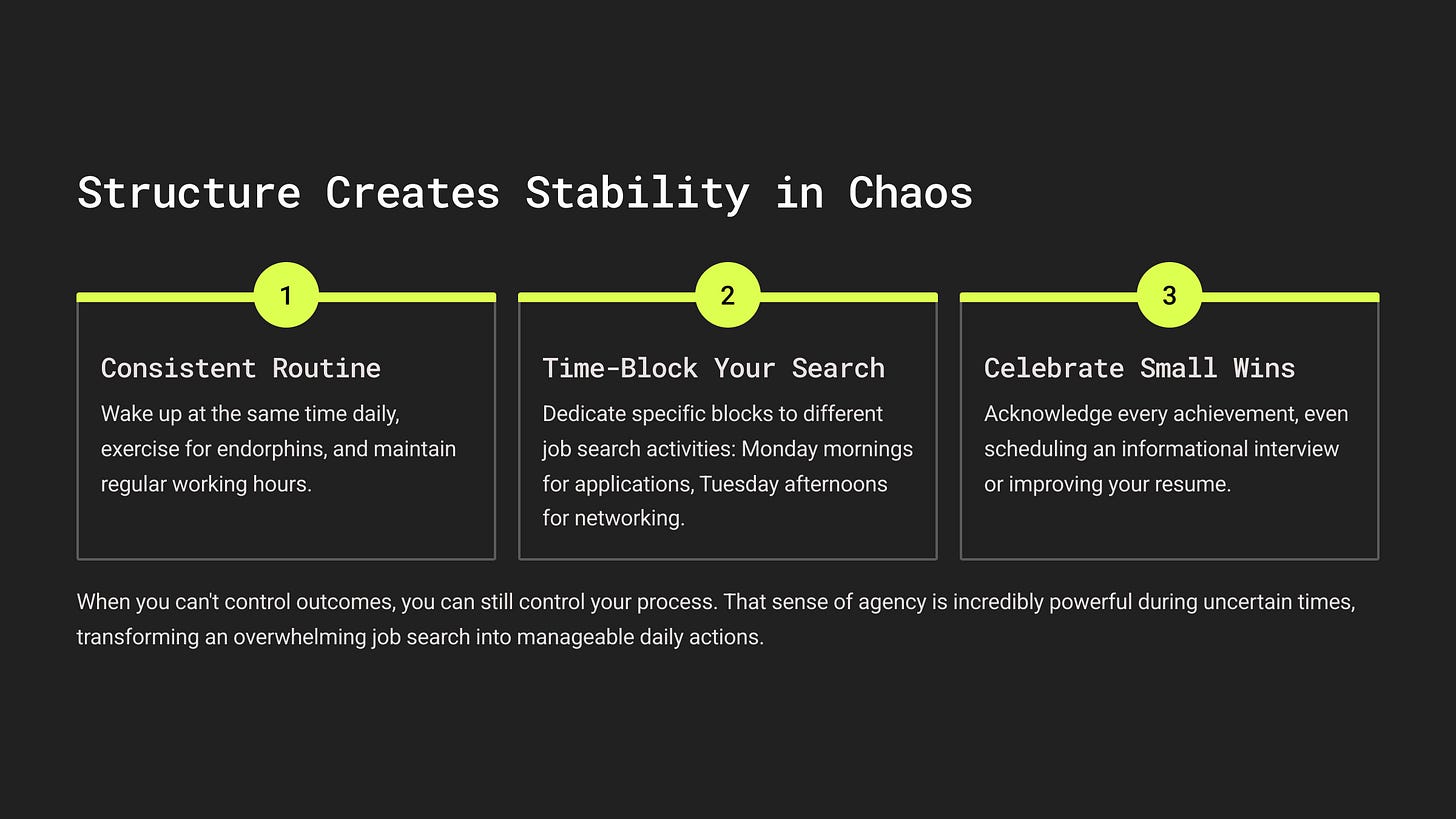How to Stay Resilient in a Brutal Job Market 💪
My post Harvard Business School rollercoaster taught me that resilience beats perfection every time
Quick confession: I didn't have a straight path to my last PM role Spotify. In fact, my post-business school journey was more like a rollercoaster that forgot to install safety bars. 😅
Let's get real for a moment. Job searching in tech right now isn't just tough… It's brutal. It feels like you're screaming into the void, watching your carefully crafted applications disappear into the digital abyss. Every "Thanks, but no thanks" email chips away at your confidence, and suddenly you're questioning everything: your skills, your worth, your sanity.
I've been there. Trust me, I've been there.
After graduating from Harvard Business School, I thought I had it all figured out. I was laser-focused on landing a product manager role in music tech. The plan was simple: graduate, apply, get hired, change the world. Reality had other plans for me.
The Rollercoaster Begins 🎢
My post-HBS journey was anything but the LinkedIn success story I imagined. I made it to final rounds with dream companies like Stripe and Patreon, only to walk away empty-handed. Then came what I thought was my breakthrough moment: offers from both Whoop and Noom.
Whoop was everything I wanted, except they weren't flexible on relocation, and I was determined to live in NYC. Being close to friends and family wasn't just a nice-to-have for me; it was non-negotiable. So I turned down Whoop and accepted Noom's offer. I spent that Labor Day weekend feeling like I'd conquered the world. 🌍
One week later, my phone rang. The Noom offer was rescinded. The CEO, who had been on vacation when the initial offer was made, decided they wanted someone with more B2B experience. Just like that, my "sure thing" evaporated.
I was devastated. Like, really devastated. The kind of devastation that makes you question if you're cut out for this industry at all.
But Here's the Thing About Resilience... 🌱
Instead of letting that be my final chapter, I picked myself up and got strategic. I listened to what the market was telling me, refined my approach, and expanded my scope. The result? Offers from Cameo, Dropbox, and Streamlit. I chose Cameo, and it turned out to be the best decision I could have made.
At Cameo, I gained the 0-to-1 consumer tech experience I desperately needed. I got promoted within six months, and that experience became my launching pad to eventually landing at Spotify. Sometimes what feels like a setback is actually a setup for something better.
So how did I build the resilience to weather this storm? Here are the frameworks that kept me grounded during the chaos:
1. Your Support System Is Your Superpower 👥
I cannot overstate how crucial my friends and family were during this journey. I spent about 60-70% of my job search at home, which helped me stay centered when everything else felt chaotic. I also traveled to visit friends, which not only recharged my emotional batteries but also created unexpected networking opportunities.
Here's what I learned: isolation is the enemy of resilience. When you're drowning in rejection emails, it's tempting to withdraw and go into hermit mode. Don't do it. Lean on your people. Reconnect with old colleagues. You never know which coffee chat will turn into your next opportunity.
The 10% Extra: Create a "resilience board" of 3-5 people you can reach out to when you're feeling defeated. Make it a mix of mentors, peers, and family members who each bring different perspectives to your journey.
2. Structure Creates Stability in Chaos 📅
When everything feels uncertain, routine becomes your anchor. I treated my job search like a full-time job, not just in hours invested, but in structure and discipline. I woke up at the same time every day, worked out (endorphins are real!), and dedicated specific blocks to different aspects of my search.
This wasn't just about productivity; it was about psychological safety. When you can't control outcomes, you can still control your process. That sense of agency is incredibly powerful during uncertain times.
The 10% Extra: Time-block your job search activities. Monday mornings for applications, Tuesday afternoons for networking, Wednesday evenings for skill development. When you have a system, you're not just hoping for progress, you're engineering it.
3. Listen to the Market Like a PM Listens to Users 📊
In the beginning, I was stubborn. I only wanted music tech. But the market was giving me clear signals that I was ignoring. I realized I was acting like a PM who refuses to look at user data, a cardinal sin in product management.
So I adapted. First, I expanded to the creator economy. Then to general consumer tech. Eventually, I opened up to any PM role where I could learn and make an impact. This wasn't giving up on my dreams; it was being strategic about achieving them.
The 10% Extra: Set up "market feedback loops" for yourself. For example: "If I get rejected from five Senior PM roles without making it to final interviews, I'll start applying for PM roles one level down." This isn't failure—it's strategic pivoting.
4. Know Your Non-Negotiables ⚖️
Even as I broadened my search, I never lost sight of my ultimate goal: becoming a product manager. I turned down operations roles and chief of staff opportunities because they wouldn't give me the skills I needed for my long-term vision.
Flexibility is crucial, but it can't come at the expense of your core objectives. You need to know what you're willing to bend on and what you absolutely won't compromise.
The 10% Extra: Write down your top 3 non-negotiables and your top 3 "nice-to-haves." When evaluating opportunities, always check them against this framework. It'll save you from making desperate decisions you'll regret later.
5. Reframe Rejection as Data, Not Judgment 📈
This one's tough but crucial: rejection isn't personal. It's data. The fact that I was consistently making it to final rounds told me I was a strong candidate. The fact I kept getting rejected at the end also suggested that I might need to target more junior roles to get my foot in the door.
Every "no" was teaching me something valuable about the market, about my positioning, or about my strategy. When you shift from seeing rejection as judgment to seeing it as market research, it becomes less devastating and more useful.
The 10% Extra: After each rejection, write down one thing you learned. Not about what you did wrong, but about what you discovered about the market, the company, or the role. This practice transforms painful experiences into valuable insights.
The Marathon Mindset 🏃♂️
My journey wasn't a sprint, it was a marathon. Every experience, good and bad, was preparing me for where I am today. The resilience I built during that difficult period has served me well beyond just job searching. It's helped me navigate challenges at work, in relationships, and in life.
If you're in the thick of your job search right now, remember that this is a temporary chapter, not your permanent story. Be kind to yourself. Lean on your community. Stay flexible but don't compromise your core values. And never, ever give up on yourself.
Your resilience isn't just what will get you through this job search—it's what will make you an incredible employee, leader, and human being on the other side of it.
This Week's Extra 10% Assignment 📝
Time for some real talk about your job search strategy. Here's your homework:
Map your runway. Assume your job search will take at least six months (yeah, I know, but better to be prepared). Get brutally honest about your budget. Where should you live to maximize your support network? Understanding your financial and emotional resources is the foundation of a sustainable search strategy.
Create market feedback loops. Be honest about the signals you're receiving. Draft a plan for how you'll respond to market feedback. For example: "If I get rejected from five Senior PM roles without making it past the first round, I'll start applying for Mid-Level PM positions." This isn't admitting defeat—it's strategic adaptation.
Stay tuned for more. I'm planning a deep dive into tactical job search strategies in the coming weeks. If you found this helpful, hit that subscribe button so you don't miss the next installment. We're building a community of resilient career builders here, and I want you to be part of it.
Remember: your current situation is not your final destination. Keep going. 💪
Quick Legal Note: The views, opinions, and advice shared here are my own and don't represent the views of Spotify or any past or current employer. This content is independent and created for educational and professional development purposes only.
Keywords: job search resilience, tech career advice, product management jobs, career transition, job market strategy, networking, professional development, job hunting tips, career growth, tech industry careers





